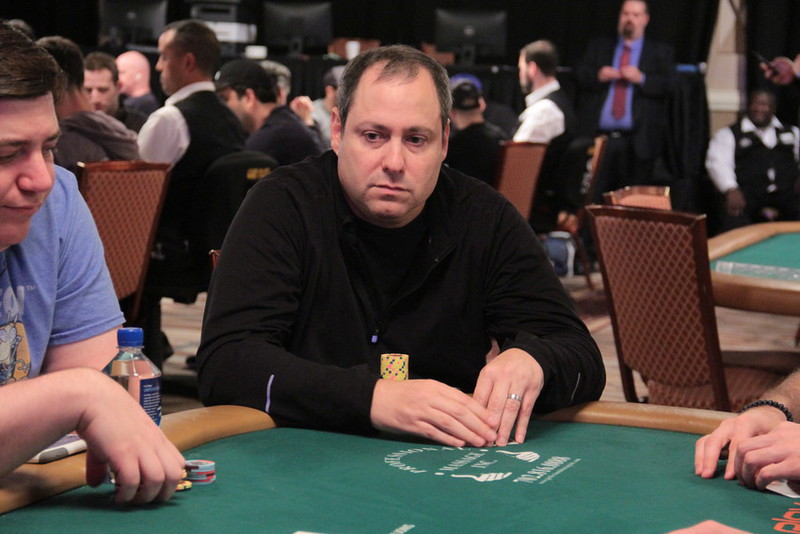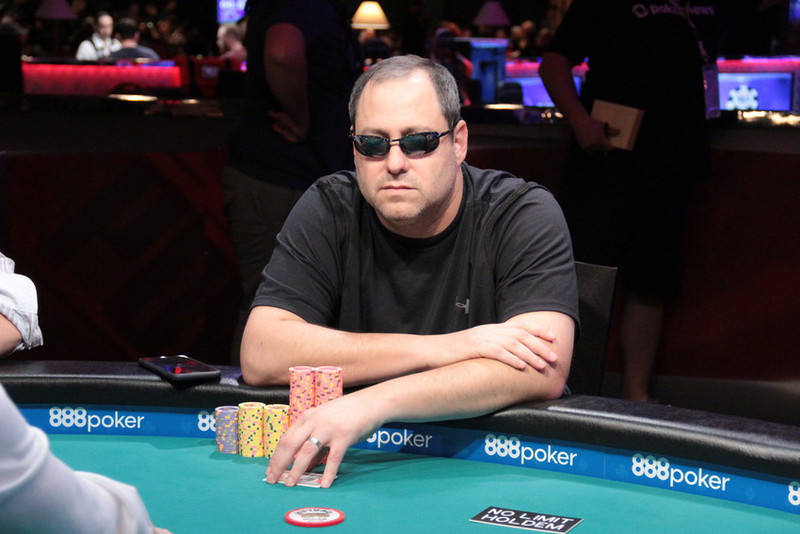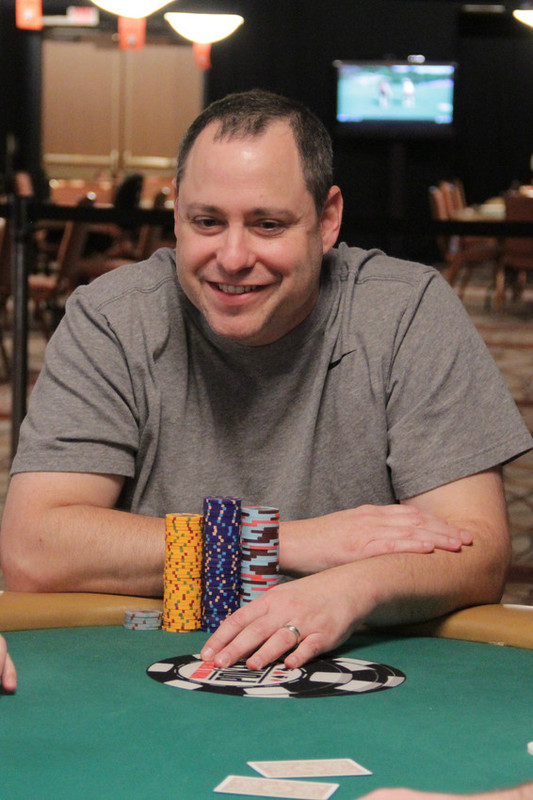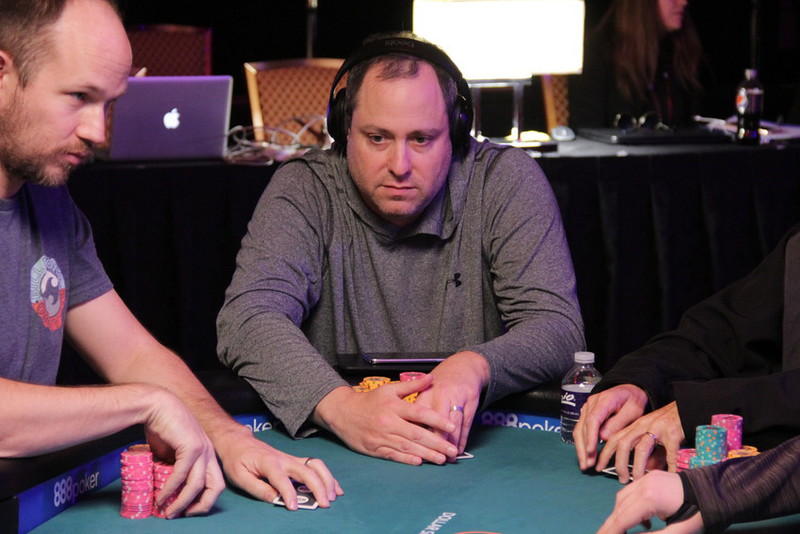






Final Table Takedown: David ‘ODB’ Bakerby Steve Schult | Published: Apr 24, 2019 |
|
|

David ‘ODB’ Baker has been a fixture in the poker world for well over a decade. The Arizona resident has consistent results dating back to 2004 with his very first cash coming back in 1993. Baker had more than $4 million in earnings and a World Series of Poker bracelet to his name before he added a World Poker Tour title and another $1.015 million to his resume with a victory in the LA Poker Classic this March.
Baker sat down with Card Player to go through his thought process of a couple hands he played at the final table en route to his first WPT title.
.jpg)
Concepts: Pot control due to ICM considerations
The Action: Darren Elias raised to 125,000 on the button, David Baker called out of the small blind and JC Moussa called out of the big blind. The flop was Q Q
Q 10
10 and action checked around. The turn was the 6
and action checked around. The turn was the 6 and Baker led out for 160,000. Moussa called and Elias folded. The river was the 8
and Baker led out for 160,000. Moussa called and Elias folded. The river was the 8 . Baker bet 160,000 and Moussa called.
. Baker bet 160,000 and Moussa called.
Steve Schult: You decide to just call Elias’ raise out of the small blind. You’re out of position for the entire hand against a good player. Is there any merit to three-betting the hand and taking the initiative?
David Baker: In a normal situation, I would probably lean towards three-betting, but with the distribution of chips and JC being short, and with Darren being such an elite player, my thought process was that I don’t really want to build pots out of position and get myself into tricky situations. If I lost a pot because I was a little passive, then that was fine because JC was so short in comparison to the other three of us.
I didn’t want to end up in super awkward spots. I also didn’t want the chip situation to switch and be in a similar spot to JC. My other option in the hand was really just folding. I thought that fold and call were pretty equal in that spot just based on the chip distribution. It’s such a mediocre hand. It rates to be better than Darren’s hand, but it doesn’t really matter. We aren’t talking about running the sim a million times. We’re talking about this one time, so I’ll be on the conservative side with one short stack and three big stacks.
SS: If you were in Darren’s shoes and faced a three-bet from the small blind from another big stack, would you be four-betting lighter than normal in that situation?

Let’s say he just flats with something like K-Q and it just comes king-high. Now I’ve just roped myself into this hand for a big pot where it’s very hard for me to cooler him with the K-10. And It’s a lot easier for him to have dominating hands with A-10, K-Q, or K-J. So I just decided that my strategy was always to play Darren and Matas (Cimbolas) on the conservative side until we got three-handed.
SS: When the action checks through on the flop, are you pretty certain your hand is good here?
DB: I thought there was a pretty good chance my hand was best. Definitely JC could have a queen. He has all the queens in his range once I flat the small blind to flat the big blind. There’s also a chance that Darren is slow-playing, but I think he pretty much has to be full to slow-play there just because that Q-Q-10 can just smash the J-9 and the K-J and the flush draw.
Even with a queen, you’re just giving a pair a free shot to hit a two-outer. You know, I have like eights and sixes in the spot a lot too.
My hand is not necessarily best against JC, but it’s probably best against Darren. Now, obviously he could have something like A-A or J-J and could just be playing pot control. I think there’s a reasonable chance my hand is good that’s why I probed the turn.
SS: You decide to bet the turn and Moussa calls. At this point, do you think he would shove a queen? How do you think your hand rates against his range int his spot?
DB: I think I’m good a large majority of the time, but I definitely think there’s a chance that he can have one of the few hands that are full here. Basically, probably only Q-10. He’s probably shoving Q-Q and 10-T preflop, so he really only rates to have Q-10 as a hand that beats me. I think he’s raising the turn if he has a queen. He has a lot of draws. He can have K-J, J-9, A-J. I think I’m definitely ahead of his range.
SS: What about your turn sizing? Did you ever think about going bigger to deny equity?
DB: Again, I’m just trying to pot control a marginal holding. I want to get value when I have the best of it, but at the same time I don’t really want to get in large bets. I think that size kind of scares off some bluffs because Q-10 and 10-10 are definitely in my range.
They’ve probably seen the stream and they could see that I flatted 100 percent of my hands versus Darren. I didn’t three-bet him once until we got three-handed. So, everything that they’ve seen up until that point was just flats. I flatted K-K, I flatted A-K, I flatted A-Q suited. So the fact that I flatted the small blind didn’t necessarily take hands out of my range. So I just felt like I could get value, but at the same time control the pot a little bit. I didn’t think they were going to make exotic plays with draws there.
SS: On the river, you decide to bet 160,000 again. Just give me your general thought process on why you decided to bet the river as opposed to check-calling or betting larger.

I had already planned on folding if he shoved. I don’t think JC is really putting it all on the line there on a bluff. So most likely he’s just trapping at that point and I didn’t want to get trapped for like 400,000. And I didn’t want to check and have him bet like 400,000 or 500,000 and have to call off that much when I could just control the river size.
SS: What’s the worst hand you are going to value bet this river with?
DB: I don’t know. I’m more of a feel player and in the moment I felt like I had it. I’m a limit hold’em specialist and you got to bet rivers when you think you have the best hand. And I thought I had the best hand. I can’t say that every time I’m going to do the same thing.
I definitely see merit to checking to pick off bluffs, but I thought he would call me with a lot there because I could just be betting J-9 or K-J. So I thought I could get called by ace-high, 7-7 or whatever. I bet small enough that he’s not only calling me with other tens. When he called the river, I thought he could have called me with ace-high.
.jpg)
Concepts: Using history to take non-standard lines
The Action: David Baker completed the small blind and Matas Cimbolas raised to 275,000 out of the big blind. Baker called and the flop was K Q
Q 5
5 . Baker checked and Cimbolas bet 375,000. Baker called. The turn was the K
. Baker checked and Cimbolas bet 375,000. Baker called. The turn was the K and Baker led out for 550,000. Cimbolas called. The river was the A
and Baker led out for 550,000. Cimbolas called. The river was the A and Baker checked. Cimbolas bet 900,000 and Baker check-raised to 2,400,000. Cimbolas used three time extension chips before folding.
and Baker checked. Cimbolas bet 900,000 and Baker check-raised to 2,400,000. Cimbolas used three time extension chips before folding.
SS: Limping in from the small blind is just not something you see very often these days. What led you to use such an unorthodox preflop line?
DB: If you watch the whole footage, I limped 100 percent of my blinds that I didn’t fold. So I probably limped 80 percent and then folded 20 percent. I think Matas is a really good player and I just wanted to try to play bigger hands in position than out of position. So I just decided that I was going to limp my whole raise. I limp-raised a few times, folded sometimes, and limp-called sometimes.
SS: Okay. So you can still have some of the more nutted hands on this runout then if you are going to be limping your entire range. That’s interesting.
DB: Something to keep in mind is that when you look at a hand in an isolated vacuum, it looks one way, but when you’re in game flow, you can make allusions to other ways as well. When we’re playing on that stage, it wasn’t like we were playing in a long session where you have very limited information. He had people on the rail giving him information (from the stream) the whole time. So he knew that I flatted him earlier when he had raised with two kings. He saw me flat him with A-K. So he saw that I was playing some big hands tricky.
What he doesn’t know or didn’t know at the time is that I was doing that six-handed, but didn’t have much intention of doing that three-handed. Six-handed we had a very disproportional chip distribution at the table. Matas, Darren, and I had way more chips than the other three players, so me flatting bigger hands was partly deception, partly protection of my stack. It was a lot of things.
SS: So you were just waiting until there wasn’t so much ICM pressure on you to open up your raising and three-betting ranges?

I limped and he raised and I thought the hand was good enough to proceed, so I called.
SS: When you check-call the flop, this is just standard, right? Bottom pair is just too good to fold against an aggressive opponent in a single-raised pot?
DB: Yeah. He could have 10-3 offsuit. Just because I limped the small blind and he raised. That’s a common thing. I’m not folding a pair heads-up with backdoor flush equity and there’s always a chance to gin trips on the turn and get it all if he has A-A or A-K or K-Q or something.
SS: So why lead the turn? Especially when this card could leave you dead against a portion of his range.
DB: I think this is a pretty reasonable card to lead just because with another king out it makes it less likely that he has a king. I think that I’m playing all my kings preflop the same, being that I limped every single small blind we played. I’m limping my 5-5 and those hands. I thought it was a pretty good card for me to lead just because I wanted to deny equity. I don’t want to give him a free card with 8-7 or J-9 or something.
If it would have been a nine or ten or a jack, I think I probably just check-fold, but I think leading the king is good. With the card removal, I think it’s less likely that he’s going to have a king and my hand is very likely to be good. And I think my story makes sense that I have a king or even a queen in this spot.
SS: When he calls, that has to narrow his range down a little bit, right? You probably have to take out the 8-7 and the J-9 and stuff. What is going through your mind when he calls?
DB: This is where it gets hairy. I pretty much had determined that he had a king at this point and I was done with the hand. When he called, I knew that he had a pretty decent hand.
SS: You just decided to represent J-10 on the river? If you were done with the hand, what made you go for a check-raise?
DB: I checked the river to give up and he bet 900,000. And the way he bet it and the way he looked, I just read, ‘I have a hand that’s too good to check here. I hope he doesn’t check-raise me.’ It’s just a live player feel. It probably gets me in trouble a lot of times too. I felt like he had a hand that he thought he had to bet. Whether it was A-Q or a bad king, I thought he had a hand that he had to bet, but wasn’t super in love with his situation.
I think that I was like ‘Well, I guess I’m just going to make it look like I have 5-5.’ I block 5-5 and I could have played 5-5 like that.

If he thinks the hand through a little bit better, or if he knew me a little bit better. Even if I do have 5-5 or J-10 there, it’s a pretty rough check-raise considering he can have A-K, Q-Q, A-A, and other stuff that are all in his range. So
I’m probably leading 5-5 or J-10 or I’m check-calling. I guess I could check-raise and then fold for the rest of it.
The problem from his standpoint and the reason why I think the play worked, in my opinion, is that nobody is ever taking this stupid ass line with a bluff. I mean, who is bluffing with three people left in the LAPC main for all their chips basically with a river check-raise? I mean, nobody does that.
I never have a value hand that he beats. I’m never doing this with K-9. So he beats no value hands whatsoever. So it’s just a matter of ‘Is this old guy bluffing off his shot at the LAPC main into this board when it smacks my range more than his?’
It’s such a suicidal bad bluff that why would you do that? I understand his fold. It’s perfectly reasonable. But when you actually break down the actual hands that I can have there, it’s pretty much K-Q and I would need to take A-A and A-K out of his range to put in that much.
I think he just chalked it up to ‘I don’t know how he got here with a better hand than me, but there is no way that he would take this suicidal line in this spot. So he has to have a better hand. I don’t know how he got here with a better hand. It doesn’t make sense, but he can’t be bluffing.’ I think he just chalked it up to that.
SS: You mention that it was something he did when he bet that led you to check-raise. As a live pro, what are some of the things you are looking for in terms of live tells that help you make these decisions?
DB: I don’t even think it’s anything in particular, honestly. The Doug Polks and the GTO guys will just make fun of it. They make fun of players like me or whatever in these spots. It’s just feel. I just felt his range. It’s just a pure energy feel.
Features
The Inside Straight
Strategies & Analysis